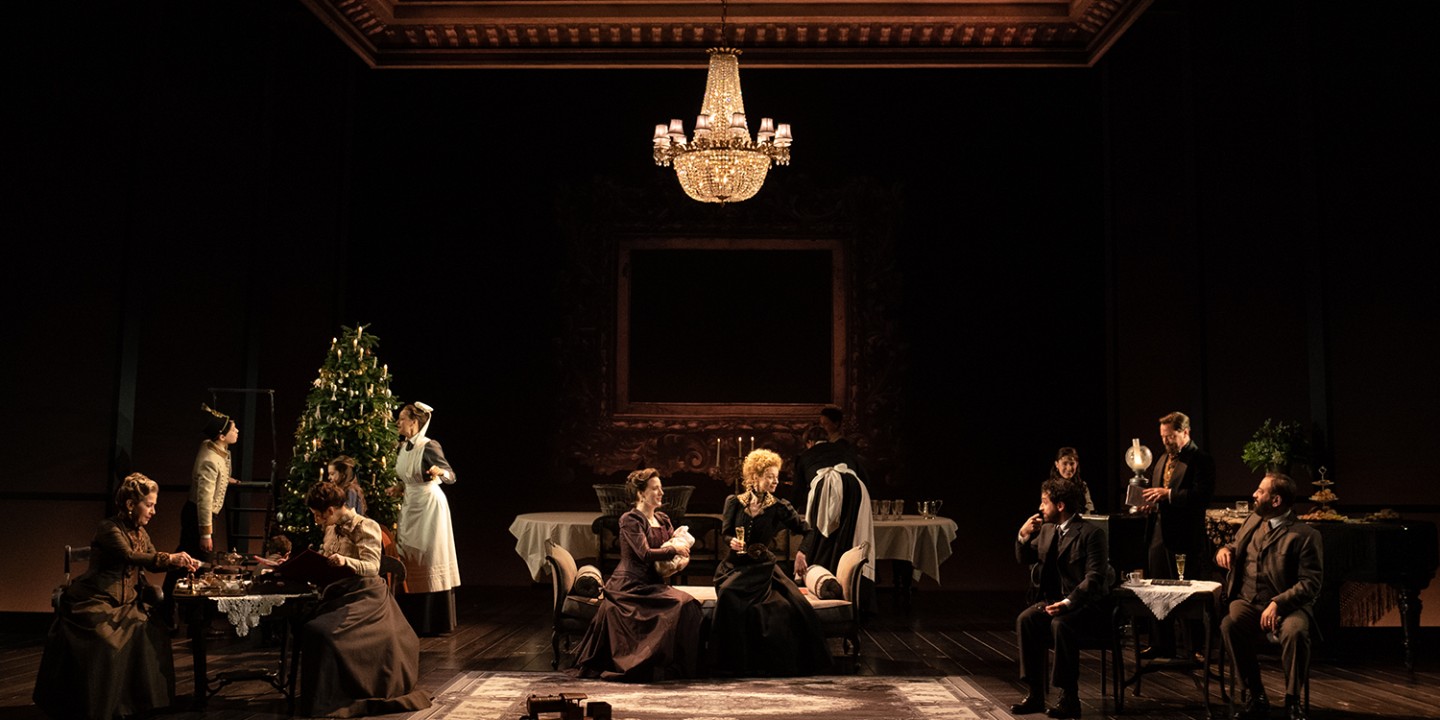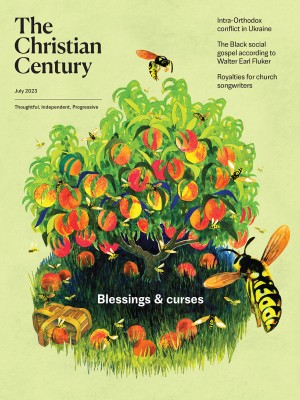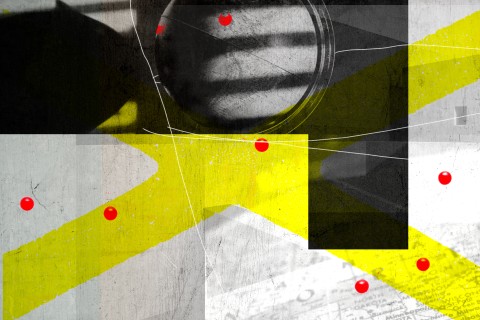Tom Stoppard gets personal
Leopoldstadt grapples with the 86-year-old playwright’s Jewish roots and his fear about the direction of our society.

The Broadway company of Tom Stoppard’s Leopoldstadt. (Photo by Joan Marcus)
Tom Stoppard’s most recent play, Leopoldstadt, opened at New York’s Longacre Theatre to effusive acclaim. The Czech-born British playwright is known for his verbal acuity, his elaborate narrative architecture, and his philosophical dexterity, first displayed in his breakout production of Rosencrantz and Guildenstern Are Dead (1966) and confirmed in subsequent works such as Jumpers (1972), Travesties (1974, winning the Tony Award for Best Play in 1976), The Real Thing (1982, another Tony award winner), Arcadia (1993), and his screenplay Shakespeare in Love (1998, cowritten with Marc Norman). In Leopoldstadt, these gifts are once again generously showcased—but this time the playwright appears to be grappling with both his family’s history and a deeply rooted fear about the direction of our society.
Stoppard’s new play is the 86-year-old’s most personal drama. In it, he recounts the saga of a Jewish family reckoning with the legacy of the Holocaust. The story hinges on Stoppard’s own struggle to come to terms with a religious and ethnic heritage he has largely ignored during his career. Stoppard’s mother escaped the Nazi dragnet in Czechoslovakia and fled to India where she was married again—this time to a British officer. She then moved to England and established a new life in a household where the calamities of the past were stored in the attic alongside the Jewish customs of earlier generations. The young Stoppard found himself at home in a world of gentiles, and until now he has seemed happy to distract himself from the trauma into which his larger family was swept.
Read our latest issue or browse back issues.
Leopoldstadt changes all of that. The opening scene unfolds in an elegant apartment where the Merz family, a highly cultured and religiously intermingled conglomerate, hustles and bustles to absorb the latest intellectual fashions, achieve economic success, and earn social acceptance. They are on the verge of the kind of full civic membership denied previous generations of Jews in Vienna. The year is 1899.
While the characters onstage are blissfully ignorant of the future, for the audience the end is painfully clear from the beginning. The dramatic irony is almost unbearable. As the play leaps through several decades, the family’s deteriorating conditions make the point unmistakable: intermarriage, educational achievement, cultural sophistication, and economic success offer meager protection against political power and entrenched bigotry. The role that the world at large has consigned to the Jews is one from which there is no escape. They are perennial outsiders, pariahs, resident aliens, a foreign body that the majority culture cannot or will not digest. Assimilation, the play suggests, is an impossibility.
As prejudice yields to persecution and discrimination swerves in the direction of mass murder, questions emerge that seem to place blame for what unfolds on the shoulders of the Merz family itself: Why did this Jewish family fail to see the writing on the wall? Was the Jewish community blinded by self-deception and wishful thinking? Were these people victims of hope, the deadly conviction that in spite of everything, people are really good at heart? Was it optimism or self-deceit that sealed their doom?
But the problem for the audience is that we, like the characters in the play, are still captivated by the delusion that everything will work out in the end, our tacit agreement that bigotry is just a bump in the road that we will overcome.
Stoppard drives home this point as the play screeches to a halt. The time is 1955, and the few family members who survived the onslaught have returned to Vienna, including Leo, a stand-in for Stoppard himself. They revive memories, which in Leo’s case have been largely eclipsed by his immersion in British society and his devotion to the game of cricket. According to his cousin Nathan, Leo lives “as if without history, as if he throws no shadow behind him.” And yet, a childhood scar triggers memories of a repressed past, and Leo learns of the devastation that claimed his larger family. The fate of his family is chained to the last word of the play: Auschwitz.
The timing of this play is meaningful and painfully relevant. Antisemitic incidents in the United States jumped to record levels in 2022, up 36 percent from the year before. The drama thus casts an eerie spell. While Jewish members of the audience may know the precarious condition of living on the knife edge of Western culture, I would guess that the vast majority of gentile onlookers don’t come to the play with a similar sense of historic catastrophe. Most White Christians, for example, live in the complacency of the American dream, convinced that something like the events of the play could not happen here, certainly not to us. Stoppard suggests we may suffer from the same kind of optimism that misled the Merz family. We too operate with the refined habits of avoidance and denial.
In the end the entire audience—Jew and gentile alike—is left with a discomfiting warning: we are deluded if we think ourselves irreplaceable and secure. We find ourselves at a cultural moment when any of us might discover ourselves classified as misfits and treated as resident aliens. Any of us might fall into or be consigned to a category that transmutes us into outsiders.
We now draw sharp dividing lines, retreat into our separate silos, and wall off “the intruders.” We embrace a discourse in which Democrats or Republicans or people with different religious views or people of different skin colors are registered as menacing threats. People are targeted by gunmen because they are Jewish or Muslim, undocumented or trans. While we may declare immunity from hatred, we are inclined to react like the beleaguered policeman who is governed by fear and cannot distinguish the face of the lethal enemy from his own reflection. We imagine the stakes are either them or us.
The truth is that our destinies are interwoven. We cannot escape the past or assimilate into a culture that suffers from amnesia. Our proclivity for self-deception must be acknowledged if we are going to survive together in this precarious landscape. When I left the theater after seeing Leopoldstadt, I had a heightened sense of our shared vulnerability and a deeper understanding of what it means to become a victim.
And yet, as powerful and urgent as Stoppard’s play is, I could not avoid the nagging suspicion that the core message is incomplete and insufficient. Our moral imagination may require even more stretching to meet the problem that Leopoldstadt describes. It’s not enough to understand and connect with the idea of victimhood. We’ve seen already in recent years the dangers to a society when people claim the mantle of victimhood and everyone competes for who is the most aggrieved.
If we are to find a path out of our political and cultural morass, we may need to develop a more expansive ethical imagination. We may need to get inside the skin of perpetrators, whether they are driven by rage or locked in bureaucratic routines in which they are just doing their jobs. We may need to recognize ourselves in the role of the spectator who does not want to get entangled in any unpleasantness and who remains on the sidelines—a complacent and mildly curious onlooker. We may need to put ourselves in the shoes of the rescuer who risks everything to protect the vulnerable. Hidden within most of us, there is an activist who will take to the streets and demand justice for the oppressed.
All of these faces belong to us. The genius of playwrights like Stoppard can help us reckon with the ways in which we embody several roles at once and must struggle to resolve our conflicting propensities.





